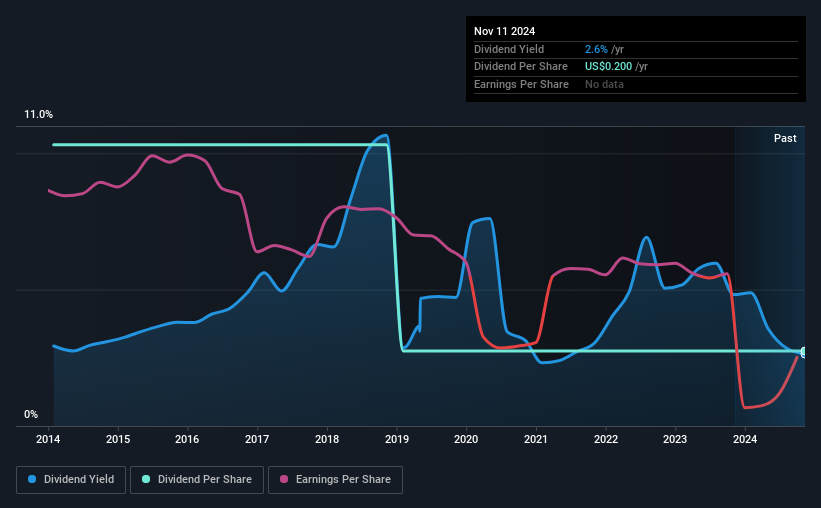
The board of Pitney Bowes Inc. (NYSE:PBI) has announced that it will pay a dividend of $0.05 per share on the 6th of December. Based on this payment, the dividend yield on the company's stock will be 2.6%, which is an attractive boost to shareholder returns.
Check out our latest analysis for Pitney Bowes
Pitney Bowes' Projections Indicate Future Payments May Be Unsustainable
Estimates Indicate Pitney Bowes' Could Struggle to Maintain Dividend Payments In The Future
Pitney Bowes' Future Dividends May Potentially Be At Risk
Impressive dividend yields are good, but this doesn't matter much if the payments can't be sustained. Even though Pitney Bowes isn't generating a profit, it is generating healthy free cash flows that easily cover the dividend. In general, cash flows are more important than the more traditional measures of profit so we feel pretty comfortable with the dividend at this level.
Over the next year, EPS is forecast to expand by 106.2%. However, if the dividend continues along recent trends, it could start putting pressure on the balance sheet with the payout ratio getting very high over the next year.

Dividend Volatility
Although the company has a long dividend history, it has been cut at least once in the last 10 years. The dividend has gone from an annual total of $0.75 in 2014 to the most recent total annual payment of $0.20. This works out to a decline of approximately 73% over that time. Declining dividends isn't generally what we look for as they can indicate that the company is running into some challenges.
Dividend Growth Potential Is Shaky
Given that the track record hasn't been stellar, we really want to see earnings per share growing over time. Pitney Bowes' earnings per share has shrunk at 31% a year over the past five years. Dividend payments are likely to come under some pressure unless EPS can pull out of the nosedive it is in. Over the next year, however, earnings are actually predicted to rise, but we would still be cautious until a track record of earnings growth can be built.
Pitney Bowes' Dividend Doesn't Look Sustainable
In summary, while it's good to see that the dividend hasn't been cut, we are a bit cautious about Pitney Bowes' payments, as there could be some issues with sustaining them into the future. The company is generating plenty of cash, which could maintain the dividend for a while, but the track record hasn't been great. We would be a touch cautious of relying on this stock primarily for the dividend income.
It's important to note that companies having a consistent dividend policy will generate greater investor confidence than those having an erratic one. At the same time, there are other factors our readers should be conscious of before pouring capital into a stock. Case in point: We've spotted 3 warning signs for Pitney Bowes (of which 1 is concerning!) you should know about. Looking for more high-yielding dividend ideas? Try our collection of strong dividend payers.
New: Manage All Your Stock Portfolios in One Place
We've created the ultimate portfolio companion for stock investors, and it's free.
• Connect an unlimited number of Portfolios and see your total in one currency
• Be alerted to new Warning Signs or Risks via email or mobile
• Track the Fair Value of your stocks
Have feedback on this article? Concerned about the content? Get in touch with us directly. Alternatively, email editorial-team (at) simplywallst.com.
This article by Simply Wall St is general in nature. We provide commentary based on historical data and analyst forecasts only using an unbiased methodology and our articles are not intended to be financial advice. It does not constitute a recommendation to buy or sell any stock, and does not take account of your objectives, or your financial situation. We aim to bring you long-term focused analysis driven by fundamental data. Note that our analysis may not factor in the latest price-sensitive company announcements or qualitative material. Simply Wall St has no position in any stocks mentioned.
About NYSE:PBI
Pitney Bowes
Operates as a technology-driven company that provides SaaS shipping solutions, mailing innovation, and financial services to small businesses, large enterprises, and government entities around the world.
Good value with moderate growth potential.


